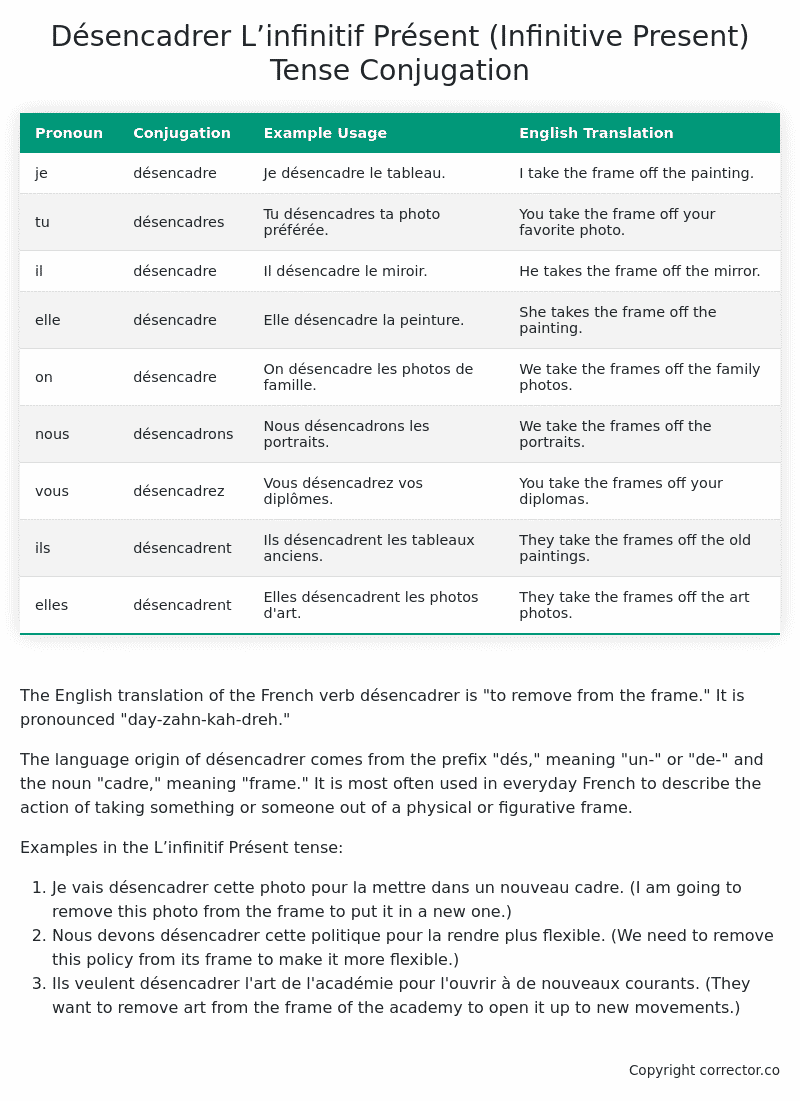L’infinitif Présent (Infinitive Present) Tense Conjugation of the French Verb désencadrer
Introduction to the verb désencadrer
The English translation of the French verb désencadrer is “to remove from the frame.” It is pronounced “day-zahn-kah-dreh.”
The language origin of désencadrer comes from the prefix “dés,” meaning “un-” or “de-” and the noun “cadre,” meaning “frame.” It is most often used in everyday French to describe the action of taking something or someone out of a physical or figurative frame.
Examples in the L’infinitif Présent tense:
- Je vais désencadrer cette photo pour la mettre dans un nouveau cadre. (I am going to remove this photo from the frame to put it in a new one.)
- Nous devons désencadrer cette politique pour la rendre plus flexible. (We need to remove this policy from its frame to make it more flexible.)
- Ils veulent désencadrer l’art de l’académie pour l’ouvrir à de nouveaux courants. (They want to remove art from the frame of the academy to open it up to new movements.)
Table of the L’infinitif Présent (Infinitive Present) Tense Conjugation of désencadrer
| Pronoun | Conjugation | Example Usage | English Translation |
|---|---|---|---|
| je | désencadre | Je désencadre le tableau. | I take the frame off the painting. |
| tu | désencadres | Tu désencadres ta photo préférée. | You take the frame off your favorite photo. |
| il | désencadre | Il désencadre le miroir. | He takes the frame off the mirror. |
| elle | désencadre | Elle désencadre la peinture. | She takes the frame off the painting. |
| on | désencadre | On désencadre les photos de famille. | We take the frames off the family photos. |
| nous | désencadrons | Nous désencadrons les portraits. | We take the frames off the portraits. |
| vous | désencadrez | Vous désencadrez vos diplômes. | You take the frames off your diplomas. |
| ils | désencadrent | Ils désencadrent les tableaux anciens. | They take the frames off the old paintings. |
| elles | désencadrent | Elles désencadrent les photos d’art. | They take the frames off the art photos. |
Other Conjugations for Désencadrer.
Le Present (Present Tense) Conjugation of the French Verb désencadrer
Imparfait (Imperfect) Tense Conjugation of the French Verb désencadrer
Passé Simple (Simple Past) Tense Conjugation of the French Verb désencadrer
Passé Composé (Present Perfect) Tense Conjugation of the French Verb désencadrer
Futur Simple (Simple Future) Tense Conjugation of the French Verb désencadrer
Futur Proche (Near Future) Tense Conjugation of the French Verb désencadrer
Plus-que-parfait (Pluperfect) Tense Conjugation of the French Verb désencadrer
Passé Antérieur (Past Anterior) Tense Conjugation of the French Verb désencadrer
Futur Antérieur (Future Anterior) Tense Conjugation of the French Verb désencadrer
Subjonctif Présent (Subjunctive Present) Tense Conjugation of the French Verb désencadrer
Subjonctif Passé (Subjunctive Past) Tense Conjugation of the French Verb désencadrer
Subjonctif Imparfait (Subjunctive Imperfect) Tense Conjugation of the French Verb désencadrer
Conditionnel Présent (Conditional Present) Tense Conjugation of the French Verb désencadrer
Conditionnel Passé (Conditional Past) Tense Conjugation of the French Verb désencadrer
L’impératif Présent (Imperative Present) Tense Conjugation of the French Verb désencadrer
L’infinitif Présent (Infinitive Present) Tense Conjugation of the French Verb désencadrer (this article)
Struggling with French verbs or the language in general? Why not use our free French Grammar Checker – no registration required!
Get a FREE Download Study Sheet of this Conjugation 🔥
Simply right click the image below, click “save image” and get your free reference for the désencadrer L’infinitif Présent tense conjugation!

Désencadrer – About the French L’infinitif Présent (Infinitive Present) Tense
Forming the Infinitive Present
Common Everyday Usage Patterns
As a Verb’s Dictionary Form
After Modal Verbs
As an Imperative
In Infinitive Clauses
Interactions with Other Tenses
Present Tense
Future Tense
Conditional Tense
Passé Composé
Imperfect Tense
Subjunctive and Conditional Moods
Summary
Want More?
I hope you enjoyed this article on the verb désencadrer. Still in a learning mood? Check out another TOTALLY random French verb conjugation!


